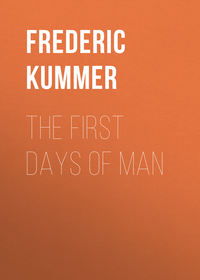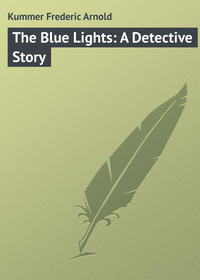 полная версия
полная версияThe Film of Fear
The chauffeur nodded.
"Yes, sir. She did."
Again Miss Norman spoke.
"Suppose I did. What then?"
"You will admit, I presume, that you fainted at the theatre the other night when the picture of the death's-head seal was thrown on the screen, and that later you escaped from the cab in which I had placed you?"
"Certainly I will admit it. The hideous thing startled me. As for escaping from the cab, I had every reason to do so. You had not only attempted to drug me, but after that you tried to steal the contents of my purse. You are the one who ought to be arrested, not I."
The woman's attitude began to annoy Duvall, especially as, so far, he realized fully that the evidence against her was entirely circumstantial and vague. He turned away, and began to search the rooms.
The search, although he conducted it with the utmost minuteness, was quite unproductive of results. If the woman possessed a typewriter, she had apparently made away with it. The scrap basket contained nothing but a few torn bits of paper of no value. There was no stationery on the small desk in the living room, no black sealing wax, such as had been used to make the seals. Duvall began to realize that the case against his prisoner was far from complete. Returning from a fruitless search of the bedroom, Duvall's eye fell upon the two suitcases that the women had carried in their flight. He bent over to them at once, and proceeded to open them, one after the other.
"Search them, please." He nodded to Grace.
The latter did so with the utmost care, but found nothing of an incriminating nature. The two women sat in stony silence, showing little interest in the proceedings. Duvall went over to them.
"Show me your rings," he said to Miss Norman.
The woman held out her hand.
"Take them off."
She stripped from her finger three rings. One was a gold seal with a monogram upon it, another a cheap affair set with pearls, the third a twisted gold band. None of the rings contained the mysterious death's-head seal, or could in any way have concealed it.
An examination of Miss Ford's stock of jewelry produced no better results.
"Let me see the contents of your purse," Duvall said, indicating a leather bag the Norman woman carried on her wrist.
She handed the bag over with an almost imperceptible smile. Duvall examined it but without result. The seal was not inside. Nor did Miss Ford's purse, a silver one, contain anything worthy of his notice. He handed the two back.
"Anything else you would like to see?" Miss Norman asked with cutting irony.
Duvall walked over to the window and looked out. It was still quite dark. The woman's assurance puzzled him. It was quite clear now that unless he could find the typewriter, the letter paper, the missing seal, and could connect this woman with them, there remained but a single way in which she could be connected with the attacks upon Miss Morton, and that would be by the direct testimony of the motion-picture actress herself, concerning the woman's visit to her room. But suppose the visit had been made in disguise. It would have been simple enough to have put on a mask on entering the room and subsequently have thrown it away. And Miss Morton, frightened as she had been, might be totally unable to identify her assailant. She had covered her tracks well. Was she then to go free?
The matter of the typewriter Duvall put aside for the moment. The woman might readily have a friend who possessed one – a hotel stenographer, perhaps, who had permitted her to make use of her machine. But the seal was a matter of more importance. His examination of the several impressions had shown him that it was extremely well carved – a decidedly expensive piece of work. Of course, the woman might have thrown it away during her flight, but it seemed unlikely. What had she done with it? The question was one to which he felt he must find an answer.
Again, with Grace's assistance, he examined the articles in the women's suitcases, testing the backs of hairbrushes, the contents of powder boxes, the interior of a cake of soap, a bottle of shoe blackening, but the search was as unproductive of results as before. Duvall was forced, against his will, to the conclusion that the woman had made away with the seal, rather than run the risk of its being found upon her person.
"Is there anything more you want of us?" Miss Norman asked, when he had again closed the suitcases. "If not, my friend and I would like to go." She rose as though to take her departure.
"Yes. There is one thing more. You will have to go to Mrs. Morton's hotel with me, so that her daughter may have an opportunity to identify you. But it is far too early to start now. I will send out presently and have some breakfast brought in."
It was beginning to grow light now. Duvall suggested to Grace that she had better go out into the little kitchenette at the rear of the apartment and see if she couldn't find the materials for preparing some coffee. He himself sat down at the little writing desk, and proceeded once more to examine its varnished surface with the greatest care. He had thought, if the letters had been sealed here, there would in all probability be some tiny spots of the black sealing wax upon the desk top, but he could discover nothing. Presently he heard Grace calling to him from the kitchen.
Directing Leary to keep an eye on the two women, he joined her at once.
"What is it?" he asked. "Have you discovered anything?"
"No, not exactly. But – what does that mean?" She pointed to a candle which stood in a tin holder on the table. "Do you notice the spots of black wax on the candlestick?"
Duvall took the candlestick up and looked at it. There were large splashes of sealing wax all over the bottom of the tin tray, not minute spots, such as might have been made by the dropping of bits of the hot wax in making a seal, but circular splotches half an inch or more in diameter, as though a great quantity of the material had been melted.
"What do you make of it?" Duvall asked.
"I don't know. Looks as though she had melted up the whole stick, for some reason or other. Possibly to destroy it."
"Hardly that. It would have been far easier to have simply thrown it out of the window. And besides, the mere possession of a stick of sealing wax, black or otherwise, could not be regarded as evidence. This woman is smart, very smart and shrewd. She did not melt that wax up for nothing. I think I have an idea of her purpose, although I cannot, of course, be sure, yet. Did you find some coffee?"
"Yes. I'll have it ready very soon. What do you make of this woman's attitude?"
"It is simple enough. She believes that she can bluff this thing out without it being possible to prove her the author of the letters. And she may be right. Certainly, unless Miss Morton can identify her, or we can discover the death's-head seal in her possession, she stands a very good chance of getting away scot free."
The coffee which Grace presently brought in was drunk by the whole party in silence. Duvall seemed unusually preoccupied. His eyes scarcely left Miss Norman; he appeared to be studying her, watching her every movement with extraordinary interest, although he strove, by assuming a careless indifference, to disguise his scrutiny. Grace, who knew his methods, realized that the sealing wax in the candlestick had suggested some clue to him, which he was trying his best to work out.
At about seven o'clock Leary was sent out to fetch some breakfast. By half past eight they were ready to go to see Mrs. Morton.
Before doing so, Duvall thought it wise to call the latter up and make arrangements about their coming. He presently got Mrs. Morton on the wire.
"Good morning, Mrs. Morton. How is your daughter?" he asked.
"Much better," the reply came. "Very much better. I am going to take her back to the apartment at once."
"The apartment?"
"Yes. She will be more comfortable there, and safer, too, I think. We came here on your advice so that we might escape this fearful persecution. But since the persons who have been threatening my daughter have discovered our whereabouts, I see no reason for remaining any longer. Do you?"
"No. I was going to suggest that you should return. I think I can quite safely assure you that there will be no recurrence of the threats."
"Why do you say that?"
"Because I think the woman who has been making them is now in my hands. I will bring her to the apartment a little later in the morning so that your daughter may identify her. Will eleven o'clock suit you?"
"Yes, very well."
"Then I will come at that hour. Good-by." He hung up the receiver and turned to speak to Grace. His eyes, however, sought the figure of Miss Norman. She had not anticipated his quick scrutiny, and had for the moment ceased to be on her guard. Duvall smiled to himself. The theory which the spots of sealing wax had suggested had in that moment received an unexpected confirmation.
CHAPTER XX
Ruth Morton had received a fearful shock the evening before, but by the morning she had recovered from the immediate effects of it, although she still felt extremely weak.
When Duvall and his little party arrived at the apartment on Fifty-seventh Street, they were received in the library by Mrs. Morton.
She greeted both Grace and Duvall cordially, but it was evident, from her manner, that she found the presence of the Norman woman and Miss Ford highly distasteful to her.
Duvall drew her to one side, leaving the two women in charge of Leary and Grace.
"How is your daughter now, Mrs. Morton?" he asked.
"Better, I think."
"May I see her for a few moments?"
"Yes. She is expecting you. Come this way, please. She is occupying my room at present. She still has a fear of the other one – the one she formerly used."
"I see. But she need not have it now. There will be no further trouble." He followed Mrs. Morton into her bedroom.
Ruth, looking very haggard and white, was sitting in an easy chair by the window. Duvall was amazed to note how terribly the shock of the night before had affected her.
"How do you do, Miss Morton," he said, offering his hand. "I am glad to find you almost yourself again."
The girl looked up with a faint smile.
"Thank you, Mr. Duvall. I am much better. I understand that you have found out who has been causing me all this trouble."
"I think I have. But before I go ahead I want you to give me a little assistance. Do you think you would know the woman who came to your rooms last night, in case you should see her again?"
Miss Morton shuddered.
"I – I don't know. I do not think I saw her face. It was all so very sudden – "
"Tell me about it," Duvall said. "It may help me to get at the facts. That is, if you feel able to do so."
"I think I do. What shall I tell you?"
"Just describe, in a few words, what happened."
"Well, as you know, I had been feeling rather better yesterday, and had begun to rather laugh at my fears. Mother was with me constantly, and Nora as well, and I began to feel quite cheerful again, especially as I knew that you were making splendid progress and had found the woman who had been writing me. Mother told me that you expected to arrest her before the day was over. She said your wife had been helping you, too.
"After dinner Nora, who had been in the hotel all day, asked permission to go out for awhile and mother told her she might go. The poor girl had been almost a prisoner since we arrived at the hotel. That was about eight o'clock.
"About half past eight a boy came to the room with a card, upon which was written your wife's name, and a note asking if she might see mother for a few moments. We both looked at the card and then mother decided to go down and see her. She instructed me to lock the door while she was out, and of course I did so.
"In a few minutes mother came back. She seemed greatly excited, said that she had seen Mrs. Duvall and that you had sent a message to the effect that you had arrested the woman who had been threatening me and wanted mother to come to your hotel at once to appear against her in court. It was necessary, the woman who pretended to be your wife said, that mother should come at once, as otherwise the woman couldn't be held.
"We talked the matter over for a few moments and I told her that I thought she ought to go. She seemed rather afraid to leave me alone, but I promised to keep the door locked, and anyway, as I pointed out to her, if the woman was arrested I had nothing further to fear.
"At last mother decided she would go, and left me. I locked the door as soon as she went out.
"It seemed to me a very few moments before I heard some one rapping. At first I supposed that mother had come back for some reason or other. Then I thought it might be Nora who had said she was only going out for a breath of air. So, suspecting nothing, I unlocked the door and opened it.
"A woman came in, very quickly, before I realized it. She was not tall, and rather slight, and I think she had light hair. I couldn't see her face well because she had twisted a black veil across it, hiding her eyes and the upper part of her features. She turned as soon as she got in the room and locked the door.
"I was too surprised for a moment to speak, then I asked her what she wanted.
"'I want you,' she said in a terrible voice, and I saw that she was taking a bottle from her handbag.
"I was so frightened that I could not cry out, although I tried. You see, the warnings I had received had gotten me so worked up that my nerves were all on edge, and as soon as I saw the bottle, I concluded that the woman was about to throw vitriol in my face. So I put my hands to my eyes and ran into the bedroom.
"The woman came behind me, saying that my looks would soon be gone, that my days as an actress were over, and other things like that which I scarcely heard I was so frightened. When she got to me she caught hold of my arm and pulled me around, facing her.
"I couldn't keep my eyes closed now, for I simply had to see what she was doing. It seemed worse not looking at her, and then I thought I might take the bottle away from her and save myself in that way. So I took my hands from my face and rushed toward her.
"Then she raised the bottle and dashed something into my face.
"It seemed hot, stinging, and made my eyes burn frightfully. I was sure it was vitriol, and the thought was too much for me I guess, for I felt myself falling and – well, that's all I remember until I woke up and found the doctor and mother there. It was a terrible experience. I could scarcely believe them, when they told me, after I came to, that I wasn't really hurt at all."
Duvall looked at the girl's face. It showed no signs of injury, although her eyes were red and inflamed.
"Then it wasn't vitriol after all?" he asked, wondering.
"No, it apparently wasn't. The doctor said he thought it must have been ammonia."
"Remarkable!" Duvall muttered to himself. "Why should she have gone to all that trouble, just to frighten you?"
"That's apparently all she intended to do from the start. Do you know, Mr. Duvall, I've been thinking this thing over, and I believe her whole plan from the beginning was merely to ruin me in my work by fear. And I must say that she very nearly succeeded."
"Very nearly," said Duvall, with a frown. "If this thing had kept up for another week or two, you would have been a complete nervous wreck."
"I am now, I'm afraid," Miss Morton said, sadly. "I don't feel as though I could act again for a long time."
"Oh, yes, you will. You have youth, and that is everything. And now, tell me, do you think if you took a look at this woman you might recognize her?"
The girl shuddered.
"Is she – here?" she asked.
"Yes. In the library."
"You think it would be quite safe?"
"Quite. She can do you no harm while I am here."
"Very well. I will see her if you wish it, but I am very much afraid that I shall not be able to identify her." Duvall held out his hand.
"Come," he said. "I will take you in."
Miss Morton rose, and walking slowly and with considerable effort, went with him into the front room. Standing in the doorway, with the detective beside her, she confronted the two women. They regarded her with stony indifference.
"Miss Morton," Duvall said, "do you recognize either of these two women as the one who attacked you in your rooms last night?"
The girl gazed helplessly from Miss Ford to her companion and back again. Then she slowly shook her head.
"No," she said. "It might have been either of them. They look somewhat alike. But as for saying which one it was, if it was either of them, I'm afraid I can't. The woman was veiled. The room was not brightly lighted. And I was very much frightened."
The look of disappointment in Duvall's face was reflected in that of both Grace and Mrs. Morton. The two women, on the contrary, seemed vastly relieved. Miss Norman's mouth curled in rather an ironical smile.
"Are you through with this inquisition now?" she asked. "For if you are, my friend and myself would like to continue our journey. You have had no right to bring us here in the first place, and I am strongly considering making a complaint against you for having done so." She grasped firmly the umbrella she had held in her hand all the morning, and turned as though to go. Leary, however, stood before the door.
"You apparently have forgotten," Duvall remarked, going toward her, "that I still have a charge against you for attacking my wife."
"Very well; make it. I can prove that your wife forcibly entered my apartment under false pretense, saying that she was collecting money for the war sufferers in Poland. If I attacked her, it was in self-defense."
"That isn't true," cried Grace. "You sprang at me – "
"My word is as good as yours," Miss Norman interrupted. "And my friend here will bear out what I say." She nodded to Miss Ford. "You also," she again faced Duvall, "broke into my apartment without warrant and killed my pet monkey. You will have to answer for that as well. You have accused me of sending threatening letters to this girl here. I defy you to prove it."
Duvall, who had been coming nearer the woman all the time, reached out and snatched from her hands the umbrella she held. The others in the room regarded him with astonishment. The woman herself gave a cry of anger, and starting forward tried to recover her lost property.
Duvall yielded it to her at once, but not before he had torn from the handle two small round balls covered with knitted silk that hung from it by a heavy silken cord.
Miss Norman, seeing what he had done, drew back with a cry of anger. A few incoherent words trailed from her lips. Duvall, paying no attention to her, ripped open one of the silk-meshed coverings and extracted from it a small, round black object about the size of a hickory nut.
He gazed at it for a moment, then going quickly to the table in the center of the room brought the thing down smartly upon its surface.
There was a crackling sound, and bits of some black substance flew in every direction. A moment later the detective raised in his hand a glittering bit of metal and held it up so that the others might see it.
"The death's-head seal," he said, quietly.
Miss Norman fell on her knees before Ruth Morton, her hands upraised.
"Forgive me – forgive me!" she sobbed.
CHAPTER XXI
"In reconstructing the case from the beginning," Duvall said, later in the day, "one fact stands out with especial prominence – the almost total absence of any definite clues."
He was sitting in the library of the Morton apartment, and with him were his wife, Mrs. Morton and Ruth.
"The thing was certainly very cleverly done," Mrs. Morton remarked. "I still do not understand it in the least. How, for instance, were the letters placed in my daughter's room?"
"I am coming to that," replied Duvall. "But first I will run over the case in the light of Miss Norman's confession to me so that you may understand it thoroughly and decide what action you wish to take against her and her sister, Miss Ford."
"Her sister?"
"Yes. The woman's name is not Norman. It is Ford – Jane Ford. Norman is an assumed name.
"The two of them came to New York about a year ago from somewhere up the state – a small town near Rochester, I believe. One secured employment in the motion picture studio – the other, the one calling herself Miss Norman, worked as a stenographer.
"Her interest in motion pictures having been aroused by her sister's stories of the life in the studio, she became an ardent picture 'fan,' and spent every evening watching the films.
"Her attention was particularly devoted to the pictures in which your daughter appeared, owing to the stories her sister told her about Miss Morton's marvelous salary, her beauty, the ease with which she had become famous.
"These stories naturally inflamed her sister's mind. Working for ten dollars a week, she began to compare her state with that of a girl of her own age earning a hundred times as much, and gradually the idea began to possess her that she could become a motion-picture star herself.
"At first she admired Miss Morton immensely and never missed an opportunity to see the pictures in which she appeared. Then, convinced of her own ability as an actress, she made application at the studio at which her sister worked for a position.
"It seems she haunted the studio for several weeks without getting any encouragement. Then, more to get rid of her than for any other reason, one of the directors offered her a place as extra woman in a picture Miss Morton was doing – a very minor part, in which she had to appear momentarily as a saleswoman at a counter in a department store.
"Unfortunately, when Miss Morton saw her she happened to say to the director that she would have preferred a woman of a different type, dark, taller, so as to provide a more effective foil to her own type of beauty. As a result, the girl did not get the position."
"I am so sorry," Ruth cried. "I hadn't the least idea who the girl was, and, of course, I wouldn't have done her any harm for the world."
"I know that," Duvall replied, "but she did not. She is mentally rather erratic, and she at once conceived the idea that you had singled her out for persecution; that, in fact, you were envious of her abilities and meant to prevent her from getting a chance.
"The thing preyed on her mind, and I fancy, unbalanced it a little. She conceived a violent hatred for you, and with her sister began to plot revenge.
"Her first move was to persuade her sister to move to the house on Fifty-seventh Street, close to your apartment. It took them some time to find the place – to secure a room situated as Miss Ford's was, but at last they managed it. Then they went to work.
"The letters were all typewritten on a machine belonging to a public stenographer whom the girls knew. Jane Ford would stop in at this woman's place late in the afternoon and asking permission to use one of the machines would type the threatening letters. The paper she used was procured especially for her by her sister at a stationery store downtown.
"The seal, a curious thing, had belonged to the girls' father, and she conceived the idea of signing the letters with it to add to the grimness of her threats. As a matter of fact, I do not think she ever had the least intention of carrying them out. It was to be solely a campaign of fear. She probably thought that she could so frighten you, Miss Morton, that your health would be broken down, and your work consequently interfered with to such an extent that you would lose your position. As I say, I think she is mentally somewhat unbalanced. I cannot account for some of her actions, otherwise.
"The mailing of the first letter, the telephone messages, were comparatively simple. It was the delivery of those at the apartment that taxed her ingenuity. Yet the method was simple enough.
"The girls' father, I am told, had been an animal trainer in a circus, and one of his bequests to his daughters was a pet monkey named Jack, that had been taught to do all sorts of tricks. The girls brought this monkey to New York with them after their father's death. When the question arose of delivering the letters in your room, Miss Morton, she decided to make use of the animal.






